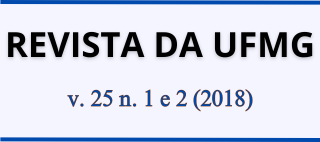The salvation of language
narrative as homeland in Die gerettete Zunge by Elias Canetti
DOI:
https://doi.org/10.35699/2316-770X.2018.19481Keywords:
Elias Canetti, German literature, Migration literatureAbstract
This article analyzes the function of language(s) and literature as key elements for the construction of a transnational and multilingual identity in the context of migration described in the autobiographical book Die gerettete Zunge or The Tongue Set Free by Elias Canetti (1905–1994). The languages and narratives mentioned in the book are analyzed in terms of their relevance for the writer’s personal development and for the construction of a perspective regarding migration and its literary representation.
Downloads
References
CANETTI, Elias. Die gerettete Zunge. Geschichte einer Jugend. Munique: Hanser, 1977.
CANETTI, Elias . Die Fackel im Ohr. Lebensgeschichte 1921-1931. Munique: Hanser, 1980.
CANETTI, Elias. Das Augenspiel. Lebensgeschichte 1931-1937. Munique: Hanser, 1985.
CANETTI, Elias. A língua absolvida: História de uma juventude. Tradução de Kurt Jahn. São Paulo: Cia. das Letras, 2010.
CANETTI, Elias. Uma luz em meu ouvido: História de uma vida. Tradução de Kurt Jahn. São Paulo: Cia. das Letras, 2010 (a).
CANETTI, Elias. O jogo dos olhos. Tradução de Sergio Tellaroli. São Paulo: Cia. das Letras, 2010 (b).
ZWEIG, Stefan: Die Welt von gestern. Erinnerungen eines Europäers. Berlim; Weimar: Aufbau- Verlag, 1990.
ZWEIG, Stefan. Autobiografia: o mundo de ontem. Tradução de Kristina Michahelles. Rio de Janeiro: Zahar, 2014.
ZWEIG, Stefan: O mundo de ontem: memórias de um europeu. Tradução de Manuel Rodrigues. Porto: Civilização 1980.
BARNOUW, Dagmar. Elias Canetti zur Einführung. Hamburg: Junius, 1996.
BHABHA, Homi. The Location of Culture. Abingdon: Routledge, 2004.
BHABHA, Homi. Nation and narration. New York: Routledge, 1990.
CANETTI, Elias. Masse und Macht. Frankfurt a. M.: Fischer, 1991.
CANETTI, Elias. Die Blendung. Frankfurt a. M.: Fischer, 1994.
CANETTI, Elias. Auto de fé. Tradução de Herbert Caro. São Paulo: Cosac Naify, 2004.
CANETTI, Elias. Massa e poder. São Paulo Cia. das Letras, 1995.
CHAMBERS, Ian. Migrating Modernities. In: LEESE, Peter; MCLAUGHLIN, Carl; WITALISZ, Władysław (eds.): Migration, Narration, Identity. Cross-Cultural Perspectives. Frankfurt a. M.: Peter Lang, 2012 (Cracow Studies in English Language, Literature and Culture. Ed. by Elżbieta Chrzano-wska-Kluczewska and Władysław Witalisz. Vol. 6.), p. 13-20.
CURTIUS, Mechthild. Kritik der Verdinglichung in Canettis Roman, Die Blendung: eine sozialpsycholo-gische Literaturanalyse. Bonn: Bouvier, 1973.
DURZAK, Manfred. Canettis Lebensroman. Zu einigen Prinzipien seiner Darstellung. In: ANGELOVA, Penka; STAITSCHEVA, Emilia (Hg.): Autobiographie zwischen Fiktion undWirklichkeit: internationales Symposium, Ruse, Oktober 1992. St. Ingbert: Röhrig, 1997 (=Schriftenreihe der Elias-Canetti-Gesellschaft; Bd. 1), p. 29-46.
EDFELT, Johannes. Award Ceremony Speech. The Nobel Foundation, 1981. Disponível on-line: <http://www.nobelprize.org/nobel_prizes/literature/laureates/1981/presentation-speech.html> Acesso em 1 fev. 2018.
ENGEL, Manfred (ed.). Rilke-Handbuch. Leben–Werk–Wirkung. Stuttgart; Weimar: Metzler, 2004.FRENZEL, Herbert A.;
FRENZEL, Elisabeth. Daten deutscher Dichtung. Chronologischer Abriß der deutschen Literaturgeschichte. Bd. 2. Vom Realismus bis zur Gegenwart. Munique: Dtv, 1990.
GIDDENS, Anthony: The Consequences of Modernity. Cambridge: Polity Press, 1999.
GÖRTERMAKER, Manfred. Geschichte Europas 1850–1918. Stuttgart: W. Kohlhammer, 2002.
HANUSCHEK, Sven. Elias Canetti. Biographie. Munique; Viena: Carl Hanser, 2005.
KRISTEVA, Julia. Strangers to Ourselves. New York (e. a.): Columbia University Press, 1991.
LEESE, Peter; MCLAUGHLIN, Carl; WITALISZ, Władysław (eds.). Migration, Narration, Identity. Cross-Cultural Perspectives. In: Cracow Studies in English Language, Literature and Culture. Ed. by Elżbieta Chrzanowska-Kluczewska and Władysław Witalisz. V. 6. Frankfurt a. M.: Peter Lang, 2012.
LORENZ, Dagmar C. G. (ed.). A Companion to the Works of Elias Canetti. New York: Camden House, 2004.
MOSLUND, Sten Pultz. Migration Literature and Hybridity. The Different Speeds of Transcultural Changes. Basingstoke (e. a.): Palgrave Macmillan, 2010.
OSTERHAMMEL, Jürgen. Die Verwandlung der Welt. Eine Geschichte des 19. Jahrhunderts. Munique: Beck, 2009.
SIN-LÉQUI-UNNÍNNI. Ele que o abismo viu: Epopeia de Gilgámesh. Tradução do acádio de Jacyntho Lins Brandão. Belo Horizonte: Autêntica Editora, 2017 (Tradução, introdução e comentários de Jacyntho Lins Brandão).
TODOROV, Tzvetan: La peur des barbares: Au-delà du choc des civilisations. Paris: Robert Laffont, 2008.
UNITED NATIONS ORGANISATION: 244 Million International Migrants Living Abroad Worldwide New UN Statistics Reveal. On-line: http://www.un.org/sustainabledevelopment/blog/2016/01/244-million-international-migrants-living-abroad-worldwide-new-un-statistics-reveal/. Acesso em 25 mar. 2018.
UNHCR. The UN Refugee Agency. Website: http://www.unhcr.org/statistics/unhcrstats/576408cd7/unhcr-global-trends-2015.html. Acesso em 21 mar. 2018.
ZWEIG, Stefan: [Abschiedsbrief ]. 22 fev. 1942. Fonte: The National Library of Israel. Disponível on-line: https://de.wikisource.org/wiki/Abschiedsbrief_Stefan_Zweigs. Acesso em 25 mar. 2018.




